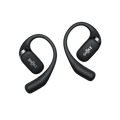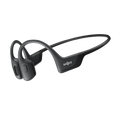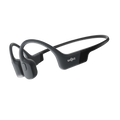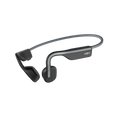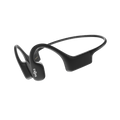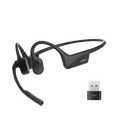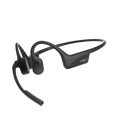With the return of spring, marathon season is again upon us. If running a marathon isn’t on your bucket list yet, it should be. Few things are as liberating, as life affirming and as involved as training for and running a marathon. You’ll find yourself eating healthier, sleeping more and feeling better! Chances are you’ll be benefitting a good cause, too.
Take your marathon training to the next level with AfterShokz open-ear headphones! Though most races don’t allow you to use headphones for the actual race, AfterShokz and our exciting open ear, bone conduction technology are beginning to change the way some marathon organizers feel about that. Whether the marathon you have on your radar allows for headphones usage or not, you’ll need some good tunes to train. Using AfterShokz is the best way to hear the music and be aware of your surroundings while you’re out there running. Below you’ll find some insider tips for running a marathon to help you prepare for the biggest race you’ve ever run.
Marathon Tips
Tip #1: Enroll
The first, most important step to running a marathon is to sign up for one. This will keep you motivated to follow through with it, and it will provide a tangible goal to work toward. Tell everyone you know that you’re running a marathon, and you will invest those people in your success. That makes you more likely to put in the work you need to succeed. Check out the marathon calendar website to see when and where they are.
Tip #2: Find a Solid Training Regimen
Step one: make your workout playlist. We recommend the most inspirational pump-up music you can find. Or you could always just go with Phish; one of their songs probably lasts an entire marathon, anyway. AfterShokz headphones are the safest headphones for runners because they don’t obstruct your ear canal. You’ll still be able to hear your surroundings, and their gentle construction will be comfortable on your head during long-distance runs. So get your playlist in order, throw on a pair of AfterShokz headphones, and get out there and train!
Step two: read up to train smarter. There are a multitude of books on the proper training schedule, and all of them have you work up to the 26-and-change miles incrementally over months. For a beginner, we recommend either The Non-Runner’s Marathon Trainer or How to Train for and Run Your Best Marathon. Start with interval running (where you run for two minutes and walk for five, etc.) until you can comfortably run three miles. Then do four runs a week of varying lengths, with the low number starting at three miles and the high number starting at 5 or 6 miles, i.e. run 3 one day, then 4, then 3, then 5. Scale all four runs upwards each week. It’s important to give yourself time to rest and build the muscles you’re exercising, so don’t run more than four times a week.
 Tip #3: Keep a Journal of Your Progress
Tip #3: Keep a Journal of Your Progress
The repetition can wear you out, so keep a chart of how far you’re running and how it feels each time you complete a training session. There’s a multitude of apps out there to help you track your mileage. We recommend RunKeeper, which uses GPS to track your distances and the time it takes you to run them. Over time, you can look at your progress and see that you are successfully approaching your goal.
Tip #4: Don’t Run the Marathon Until the Marathon
You don’t need to run all 26 miles and 385 yards – not once – until the day of the race. The highest you ought to get while training is around 20 miles. On the day of your actual marathon, you will find that you are in good enough shape to push the last couple of miles out and haven’t burned up all your energy in training.
Tip #5: Hydrate!
We can’t stress this one enough. Drink as much water as you can stomach, and drink beverages that contain electrolytes to help you retain the water. You sweat an incredible amount while you’re running, far more than you realize. Though you may feel dry for certain stretches, that doesn’t mean you aren’t perspiring. You don’t want dehydration to ruin the last few miles of a life-defining event!
With the above tips as tools, and with some excellent headphones, nothing can stop you! Get online and find a marathon near you today! The roads aren’t going anywhere, so if you need a little extra time to train, don’t sweat it. To have a completed marathon under your belt will shift your perspective and give you a new confidence that you'll carry with you long after the race is over.
